
Arquivo para a ‘Economia’ Categoria
Polycrisis and hard words
We have already talked about the crisis of thought, the excess of very special people who lose sight of the whole, the idealist prison, which was born in a pre-Socratic idealism, as Popper pointed out, and an emptiness of the capacity to renew thought.
special people who lose sight of the whole, the idealist prison, which was born in a pre-Socratic idealism, as Popper pointed out, and an emptiness of the capacity to renew thought.
Morin’s proposal to reform thought is to open the drawers of thought and articulate them in a complex model (from the Latin complexus, which is woven together) outside of “specialty” and conceptualism.
What before seemed like a warning is now present in several speeches besides ecologists: the planet shows signs of exhaustion, extreme temperatures, even in places where it seemed impossible: cold in the southern hemisphere and intense heat in the northern hemisphere, also animal life is perishing, the current news is the almost extinction of the emperor penguin, which were large colonies.
The planetary core also manifests itself, the number of volcanoes and earthquakes grows, Haiti calls for help after a new earthquake and a hurricane that weakened even more that poor country.
The return of the Taliban to power in Afghanistan, the military in Myanmar and other neo-totalitarianism, all these seem harsh and pessimistic words, of course we always hope, it is not humanity’s first crisis, but perhaps this is the most global and the most general of all and could become a civilizing crisis, in the midst of a pandemic that persists, and it is neo-denial to say that it has passed, the new variants are threatening, and the WHO itself and many scientists are warning.
Perhaps a barely perceptible level is that of religiosity, in addition to the disrespect for various beliefs, there is internally a crisis that we can call a “despiritualized ascesis”, using a word from Peter Sloterdijk, which we translate here by its root, ascesis “without” admitting The spirit.
It says a biblical passage in which Jesus is questioning his disciples who thought his word was too harsh (Jn 6:61-63):
“Knowing that his disciples were murmuring about this very thing, Jesus asked: “Does this offend you? And when you see the Son of Man ascending to where he was before? The Spirit gives life, the flesh does nothing. The words I spoke to you are spirit and life. But among you there are some who do not believe”.
He is speaking to his disciples and to those who believe, and if he does not have spirituality, he does not have Faith.
Delta variant and slow vaccination
The delta variant of covid 19 has lit a warning around the world that the pandemic may not yet be under control. In Brazil, the recent Oswaldo Cruz Foundation Bulletin (FioCruz) states after a study that there is a dangerous combination, high Delta contagion and slow vaccination .
the pandemic may not yet be under control. In Brazil, the recent Oswaldo Cruz Foundation Bulletin (FioCruz) states after a study that there is a dangerous combination, high Delta contagion and slow vaccination .
The risk of the explosion of a new wave of contamination and infection is worrying, the study points out that Brazil already has 435 confirmed cases of the Delta variant and in 19 states the levels of contamination are dangerous despite being declining.
In an interview with CNN, last Friday (08/06), deputy director Jarbas Barbosa of the Pan American Health Organization (PAHO) warned that confirmed cases of the Delta variant in Brazil are just the “tip of the iceberg” and highlighted the importance “that the vast majority of cases of the variant are asymptomatic or mild, which do not realize and are not tested”.
We cannot relax prevention and isolation measures, recalled Jarbas Barbosa, in the cases of Chile and Uruguay that after relaxing measures had a new wave of infections, although Uruguay announced a weekend without deaths for the first time.
The contagion comparison made with the Delta variant is didactic, as contagious as chickenpox, can cause more severe symptoms than the previous variants and are also transmissible among vaccinated, according to the US Centers for Disease Control and Prevention ( CDC), in an article published in The Washington Post, in a note signed by Maíra Menezes, the Fiocruz postcard also warns of the danger of this variant.
Vaccination is important, which is still slow, the current numbers are close to 45 million for the two doses and 100 million for the first dose, it is possible to accelerate and as there is still no explosion of the Delta variant in the country, if combined with preventive measures, we can prevent a new wave of infections, hospital overflows and deaths.
Both infections and deaths that fall slowly in Brazil have a tendency towards stability with a slight increase, it is too early to say that it is the Delta variant, but a policy of testing and prevention would be important, researchers of Fiocruz warns of the lack of a plan B.
Accelerated vaccination and new concerns
Vaccination accelerated in July as was the optimistic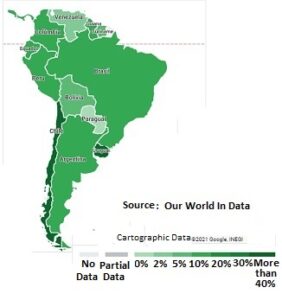 expectation, the fall in infections and deaths is still very slow and the new waves of infection in countries in the region such as Chile and Argentina light a warning sign, Peru was already in high numbers and some countries in Europe, such as Russia, also show that the Epidemic is far from over.
expectation, the fall in infections and deaths is still very slow and the new waves of infection in countries in the region such as Chile and Argentina light a warning sign, Peru was already in high numbers and some countries in Europe, such as Russia, also show that the Epidemic is far from over.
Argentina reached on Wednesday (14/7) the symbolic mark of 100,000 deaths, high for a population of 44.5 million inhabitants, and entered a new lockdown, with results already containing the new high, the numbers in week fell again.
Brazil like Argentina reaches the number of vaccinated 16% and 11% respectively, while the first dose in Brazil reaches 44.5% and Argentina 45% (see chart above), the next numbers suggest greater attention to the possibility of a new ascending curve, it would be a greater expansion of the delta variant, climatic factors (Chile and Argentina are colder) or even a variant called lambda , and the effectiveness of the Russian Sputnik is questioned.
The lambda variant detected in Peru is frightening, called C.37, its preliminary studies indicate greater lethality and the ability to circumvent vaccines is serious. Researcher Pablo Tsukayama, coordinator of the Microbial Genetics laboratory at the Cayetano Heredia de Lima University, detected that the variant it is already 100% of the infected cases in Peru as of April 2021.
The lack of open data hinders the research, the Ministry of Health of Peru does not disclose it and Professor Tsukayama is one of those protesting this lack of access.
Another issue of concern is the lack of scientific data on the effectiveness of vaccination for the new variants, there are many people who make statements trying to compromise, but do not present clear scientific studies, for example, on new variants such as lambda.
One of these studies, reported by the newspaper El País on July 11, is by Chilean virology Ricardo Soto Rifo, who focused on the CoronaVac vaccine, the main one used in Chile, in a group of volunteer health workers who discovered that lambda presents “increased capacity for infection and immune escape against neutralizing antibodies”, the extent of such loss remains to be clarified.
Another study pointing out in El País is that of the Pfizer and Moderna vaccine, from the University of New York, pointing out that the results were “relatively lower”, but Professor Tsukayma makes a less than encouraging observation: “It is practically impossible to predict how a virus will suffer mutation”, but reducing transmission is possible through vaccines and this is effective.
Fall trend and vaccination in Brazil
According to the consortium of press vehicles, the number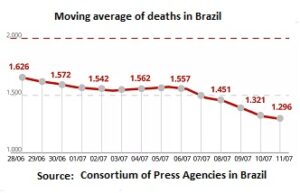 of vaccine doses in Brazil reached 83,794,712 for the first dose, while 28,108,088 for the second, to this value must be added 2,465,295 single doses, for a total of 114.3 million doses applied, it is expected to grow to maintain the declining curve seen in infections and deaths.
of vaccine doses in Brazil reached 83,794,712 for the first dose, while 28,108,088 for the second, to this value must be added 2,465,295 single doses, for a total of 114.3 million doses applied, it is expected to grow to maintain the declining curve seen in infections and deaths.
In percentages it means 14.4% who have already received either the second dose or Janssen, which is a single dose, while the percentage that received the first dose is close to 40%, this being important to contain the most offensive variants, the delta and the delta plus, which are already in the country.
It should be noted that clinical analyzes indicate that the second dose is needed for the new variant, and a wider range above 60% starts receiving the second dose, but the application of Janssen is the most optimistic because the number of can make the immunization grow.
When will we achieve so-called herd immunity that will allow for the relaxation of protective measures is the question we all want to know, Anthony Fauci, head of the US National Institute of Allergy and Infectious Diseases, one of the leading physicians in the efforts against covid-19 in there, it estimates that it should reach 70% of the population, but there are others who indicate that it would be 80% to 90%, as the biggest problem is the mutability of the virus.
Japan, which has numbers close to Brazil, 17% for the two doses and above 30% for the first dose, has already announced that there will be no public at the Olympics starting in a week, and the athletes’ trips will be monitored with all measures of protection.
At the pace of vaccination, all precautions are still needed, whenever there has been some relaxation, there has been an increase in cases and deaths, we expect the curve to keep falling.
Falling curve but slow vaccination
Despite the curve of infections and average deaths (see curve), the problem starts to be the second dose that is stable at 12% in the last week, we warn that the problem could get worse because the number of doses of AstraZeneca and Coronavac should increase because of the second dose.
the problem starts to be the second dose that is stable at 12% in the last week, we warn that the problem could get worse because the number of doses of AstraZeneca and Coronavac should increase because of the second dose.
The number of confirmed cases on Friday was 54,101 and the moving average of the last 7 days was 50,905 infections (in 14 days a drop of 30%), the number of deaths, although still high, is below 2,000 deaths, and there is no state in high, also the ICUs are beginning to be relieved, the most serious regions are around 70% hospitalizations, but in decline.
The controversies of expired vaccines, and the case of Janssen who had many vaccines frozen (they need a special temperature system of -2°C) but are safe, says the Ministry of Health, in addition and Belo Horizonte now also Campinas applied doses of the vaccine in homeless people, a commendable humanitarian measure, since this vaccine immunizes in a single dose and these people have difficulties with sanitary measures.
Cases of expired vaccines are being identified in several cities, some places like the city of Rio de Janeiro had wrong registration in the system, the situation is not out of control and in several cases a new vaccination is already being done, it is important to check with precision the cases where the vaccine was really expired, where there was a system error and the exact number.
The case of the purchase of the Indian Vaccine Covaxin became the center of the government’s political crisis due to accusations of corruption, the negotiation was suspended by the Ministry of Health and the purchase should be canceled, in addition to the politicians, the CGU should also continue with the investigation process.
The serious problem is the slowness of vaccination, we warn that in July, several factors could put the process in check, the need for a second dose, which upon arrival in the municipality is immediately available for vaccination.
The executive secretary of the National Council of Cities Secretariats in Brazil (Conasems), also explaining the case of expired vaccines, guaranteed that the vaccines arriving are immediately made available to the population, so the problem is Anvisa’s (Health Control in Brazil) this control.
Mauro Junqueira, the secretary of Conasems however clarified that it is not always possible to have direct control on the tablet or computer system, sometimes it is done on paper and then placed in the computerized system, the diversity of municipalities in the country explains this easily.
We insisted on the need to increase the production of vaccines for the month of July, the number last Wednesday according to CNN was 3 million doses of Janssen vaccine, 3.33 million doses of Pfizer’s immunizing agent and another 7.15 million of the AstraZeneca/Fiocruz product, total 13.5 million.
The Delta variant and suspected vaccination
A new variation of the Delta virus originated in India has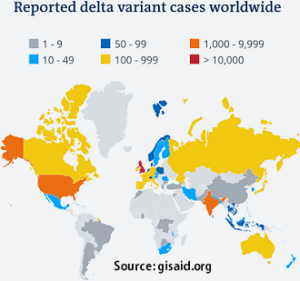 appeared and is already spreading, called Delta Plus, the virus is more lethal and there are cases in several countries around the world, in Brazil a pregnant woman is the first reported case, she was 42 years old and died within days after contagion.
appeared and is already spreading, called Delta Plus, the virus is more lethal and there are cases in several countries around the world, in Brazil a pregnant woman is the first reported case, she was 42 years old and died within days after contagion.
The growth of 30.6% of infections and 17.2% of deaths in Chile raised suspicions about the vaccination with the use of CoronaVac, social media media spread this news, since there 90% of the vaccination was done with this vaccine and Chile was an example until recently and there is still no Delta variant.
According to news reported by various press information centers (among them the AFP) this correlation is not true because the number of deaths is not proportional to the infection, and among those infected and dead are mostly not vaccinated, said Chilean doctor Vivian L Farias.
Another increase was in Russia, 20,000 new cases, with 7,916 in Moscow, the highest number of confirmed cases in a single day since January 24, when vaccination had not started. in the country, new restrictive measures are being taken.
The big problem there is also the distrust of the population, there are too many vaccines and not everyone is looking for vaccination, the restaurants are thinking of serving only vaccinated people and other measures can be taken in this regard.
Vaccination in Brazil will reach 70 million people vaccinated with the first dose, the Jannsen vaccine is starting to arrive in the country, it only needs one dose, it is highly effective and in Belo Horizonte the first recipients were homeless people, Pfizer sent more 936 thousand doses and reaches 2.4 million doses, 6 thousand liters of inputs for CoronaVac arrived in Brazil, giving 10 million doses.
In June, in the first 24 days, the average vaccination per day was 1 million doses, but because of the 2nd increase in demand. dose of AstraZeneca in July, it has a space of 12 weeks from the first dose, the vaccination may suffer problems, it is necessary to pay attention to this aspect.
As of June 20, the Ministry of Health had distributed 46.6 million doses of AstraZeneca for the first application (source uol), however, from July onwards, an equal number of doses plus those who will receive the first dose would be necessary. it would be necessary to almost double the manufacture over 21.3 million doses are the calculations of health agents.
The concern of the World Health Organization with the new Delta variant, which is already in 85 countries, is the fear that this new strain will be able to modify itself to the point of circumventing the prevention, treatment and vaccine measures available, the WHO president himself emphasized this fact (various press agencies, in the USA, news in CNBC and others).
The Delta strain and new dangers
The new Indian strain, called Delta by WHO, re-infects and can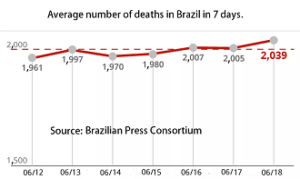 become dominant, it is 40% more transmissible and can present twice the risk of hospitalization, in addition the symptoms are deceiving because they seem more like a bad cold and people continue to come out, according to the English newspaper The Guardian.
become dominant, it is 40% more transmissible and can present twice the risk of hospitalization, in addition the symptoms are deceiving because they seem more like a bad cold and people continue to come out, according to the English newspaper The Guardian.
This is prompting the UK to re-evaluate the easing date, previously scheduled for 21 June, which is now expected to be delayed.
Vaccination continues, however, the effectiveness of some vaccines is beginning to be put in check, AstraZeneca itself already admits setbacks in the third phase of tests, carried out on a larger scale of vaccinated people, some newspapers mention 33% but the official WHO indication is 63.09%, slightly above Coronavac, which is around 51%, and below Pfizer, which is 70%, but with the 2nd. dose the numbers are similar around 80%.
A breakthrough in research, done by Beaumont Hospital in Dublin, finally explained why blood clotting in patients with Covid 19 is high levels of pro-coagulation VWF (von Willebrand Factor) molecules and low levels of ADMTSS (a plasma protease which is anticoagulant) due to alterations in proteins in severe cases of covid.
Basil received a batch of 824.4 thousand doses of the Pfizer/BioNTech vaccine from the Covax Facility consortium that arrived at Viracopos airport in Campinas (SP), the first batch of this vaccine by the consortium, the others were purchased.
Brazil reached the sad mark of 500,000 deaths, with a number of deaths above 2,000, and with a number of infected at around 80,000, these are still high numbers, but the leap above 3,000 would mean a third wave that continues to threaten us.
According to the consortium of companies in Brazil, more than 63 million people received the first dose, totaling almost 30% of the population, and almost 80% of the available vaccines were used, it is believed that this number could reach 100 million and total close to 50% of the population with the first dose, a number that we reaffirm will be enough to hold the 3rd. wave.
It is necessary to redouble the care and avoid crowding, more rigorous isolation measures need to be taken.
Curve and vaccination efficiency
The curve shows an advance in the first doses, but the second doses can still be a problem, it is necessary to have a protocol for those who are vaccinated in order to encourage them to take the second dose.
doses can still be a problem, it is necessary to have a protocol for those who are vaccinated in order to encourage them to take the second dose.
Studies involving post-vaccination and its efficiency are beginning to be publicized, it is called phase four, as explained, for example, by professor Guilherme Werneck from the Institute of Studies in Collective Health at UFRJ (Federal University from Brazil).
Janssen vaccine arrives in Brazil in 3 milhões de doses in tuesday (06/15).
The completion of these surveys can take up to two years, the positive data are encouraging, and affirm the positive impact of vaccination, but the problem of the 2nd. dose is detected and pointed out, in addition to the immunity problem, it also undermines the conclusive results of the research.
These studies are called pharmacovigilance (which investigates adverse effects of the vaccine) and the effectiveness of immunizing agents in containing the pandemic and reducing mortality, we have already posted about the case of Serrana (SP, Brazil), with the immunization of the entire population, where the cases of Covid-19 plummeted.
The number of vaccinations in Brazil is for a total population of 201,103,330 is 53,224,020 (26.5%) were vaccinated in the first dose, in the second dose 23,534,567 (11.7%), giving a total of 37, 17 doses for every 100 people, the world average is 30.07 for every 100 people.
The G7 meeting that takes place these days, according to Downing Street announced that it will donate 1 billion vaccines with the aim of putting an end to the Pandemic by 2022, the number of people vaccinated in the first dose has not yet reached 1 billion people, for a population worldwide of 7 billion.
The third wave is attenuated in Brazil
We posted here that it was possible to reach figures close vaccines  to 50% by the end of June and that the first week was decisive, the data indicate a reversal of the curve, but it is necessary not to hesitate and continue the vaccination, Brazil received new doses from Pfizer (more than 500,000) and AstraZeneca’s vaccination continues to do well, and the forecast is for another 40 million doses by the end of the month.
to 50% by the end of June and that the first week was decisive, the data indicate a reversal of the curve, but it is necessary not to hesitate and continue the vaccination, Brazil received new doses from Pfizer (more than 500,000) and AstraZeneca’s vaccination continues to do well, and the forecast is for another 40 million doses by the end of the month.
It can be said that at this moment there is an attenuation, the number of deaths on Friday is 1689 while infection is above 66,000, figures that show the importance of vaccination as the number of infections is still very high and without vaccination the of deaths would remain high.
The deceleration of vaccination is pointed out in some media, but it is not clear whether it is the distribution or application, it can still be a third thing, operationalization, which would be very regrettable since the INSS and the health departments have a good structure and distribution.
In percentages the number of vaccines distributed, the government speaks of a number above 100 million and the states say they have received 90 million, and there are vaccines in stock, in percentage would be 52 million from AstraZeneca/Oxford/Fiocruz, 47.1 million from Coronavac and 3.5 million from the Pfizer/BioNtech vaccine, this variation is interesting due to its efficacy for different ages.
The distribution carried out so far already allows the application of doses, at least the first dose, in 18 of the 28 priority groups of the PNO (National Plan for the Operationalization of Vaccination against COVID-19), which was defined by social vulnerability and greater risks of comorbidities.
The current stage is beginning to prioritize comorbidities in different age groups and health professionals, but the trade that would be extremely important is not included in the plan.
The numbers in the world are still worrying, see the graph, there are still countries with the possibility of a third wave and a definite lesson from the Pandemic is that we must worry about everyone.
The danger of the third wave and the vaccine for the poor
The richest countries in the world have only 13% of the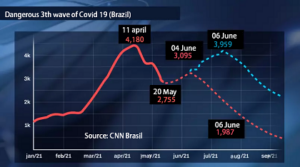 total population and for this first semester already have more than half (51%) of the doses of vaccines against covid-19 in development, the search for profit and the market dispute has led to this.
total population and for this first semester already have more than half (51%) of the doses of vaccines against covid-19 in development, the search for profit and the market dispute has led to this.
A strain of the virus is advancing in India that does not yet have very decisive data on the effectiveness of vaccines, so sending a test to the state of Maranhão is important, we will be able to know the effectiveness of the 3 vaccines that are already in Brazil for this variant , Coronavac, AstraZeneca and Pfizer, although the number of doses is still small, Brazil made a purchase of 100 million doses for October.
We need to go through the reverse with some security, the CNN website (figure) warns of the real danger of the third wave, the production of more vaccines with input already made in the poorest countries will be decisive for an increase in vaccination, which is still slow.
In percentage terms the logic is simple, if by the first week of June we are close to the level of 4 thousand daily deaths, the third wave has arrived, if we are below 2 thousand it has been stopped.
A shipment of Active Pharmaceutical Ingredients (IFA) arrived this Saturday at FioCruz, and will be used for the production of 12 million doses of vaccines, with the production of inputs in the country already started we can reach around 20 million doses (the promised is 18 million doses), will still be insufficient if Coronavac does not increase its production.
The government beckons with a total of 90 million doses, and the second dose for people over 70 is about to start, but it is necessary to respect the 90-day interval of the AstraZeneca vaccine.
In the case of Coronavac, the ideal interval is 21 to 28 days, to increase the effectiveness to 62.3%, but it is being used in an interval of 14 to 28 days, this effectiveness, which is low, can be maintained.
The essential thing now is to keep an eye on the new strain of India that already has registered cases in the country, make a strict isolation and maintain the protocols of maximum security, a poorly done thing.

